Immigrants like Sunny Xiao have left families behind,
only to be stuck in low-income jobs in the U.S.
"For us who came to America to find jobs, it's truly a hard choice since no one wants to stay in an unfamiliar country by themselves, but the reality is we need the money to support our families," said Sunny Xiao, who immigrated to the U.S. in her 50s and now works as a housekeeper.
Though considered to be part of the so-called model minority of high-achieving Asians and Asian Americans, Xiao and other low-income immigrants from China are, in fact, not at all rare in the California labor force.
They represent a relatively neglected community: employed in low-skill jobs and living on limited incomes because they came to the U.S. without wealth or outstanding skills. With limited English and lack of access to improving their language proficiency, many find it nearly impossible to apply for higher-salary jobs.
"The way that they're going to get ahead in America is really through education, but the challenge is that if they came here without high English skills, then the process of learning English might become the big barrier," said Li'i Furumoto, a project director for the legal advocacy group Asian American Advancing Justice-Los Angeles.
Greater Los Angeles is home to more than 520,000 residents of Chinese descent, the most of any U.S. metropolitan area, according to 2012 estimates by the U.S. Census Bureau. When considering this community, key words such as "wealthy" or "successful" rank high in many people's impressions.
In the San Gabriel Valley, an ethnically concentrated area where the majority of Chinese immigrants in Los Angeles County live, the poverty rate of the population of Chinese descent is 14%, higher than that of Asian Americans overall and the white population.
Taking a closer look, the Migration Policy Institute, in a 2016 report titled "Emigration Trends and Policies in China," noted: "Chinese emigration is characterized by a widening divergence between the migration of highly skilled and wealthy individuals on the one hand, and of the low-skilled or unskilled on the other."
The situation was not optimistic for Sunny Xiao before she applied for political asylum to come to the U.S.. In China, she was not qualified to receive any pension or allowance because she lived in a rural area and had little formal work experience.
With three children and four grandchildren in her family, and her husband having died several years ago, she was motivated by economics to leave China.
"It's already stressful for them (the kids) to make money and support their own families," Xiao said, "so the money I earned here cannot only supplement our big family, but also provide a solid foundation for my old age."
She had to give up her first job, as a massage worker, with its higher salary, because she could not keep up with the physical stresses.
Now employed as a housekeeper, Xiao earns $2,800 every month when she has full-time work. "The good thing about being a live-in housekeeper is that I don't have to spend money on food or a house, so I can send most of the money home."
With her salary here, much lower than the U.S. median, but higher than what she could make back, Xiao has paid off her children's debts.
"People who work here are all for their children and themselves, without exception," she said of the Chinese immigrants she knows.
When she has been between jobs, she has had to live in a cheap family hotel, which costs her about $15 a day.
"Basically I will go to the employment agency every day to see if there is a suitable job for me," Xiao said. "It's exhausting, though, but I have to because I won't have any financial source if I don't work."
Without English language proficiency or other useful skills such as driving, it's difficult for Xiao to compete for better jobs.
Asked about her family, Xiao paused for several seconds. "No one escapes nostalgia here, but we don't have other choices," she said sadly. "I really feel lonely in this country. I wouldn't have come to America if my husband were still alive. Truth be told, I miss home every second. My dream is about going back home."
On Chinese New Year in February, the most significant traditional holiday in China for the family, Xiao could not afford to make it home.
"I must seize the opportunity to make as much money as possible when my health situation allows," she said, "and then I can go back home as soon as possible."







